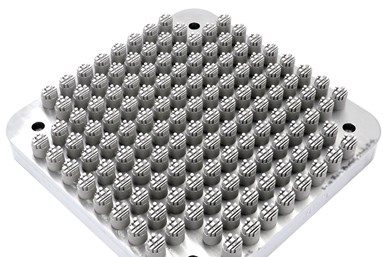Zeiss and ORNL Collaborate on Automated Print Parameter Qualification Solution
According to Zeiss and ORNL, the fully automated qualification solution can comprehensively evaluate a set of printing parameters in less than 12 hours.
Share





Zeiss’ has announced a new additive manufacturing solution service, ParAM (parameter for additive manufacturing) aimed at producing defect-free parts. Print parameters enable printing with a new material, adapting to change in powder characteristics and increasing print speed by increasing layer thickness to even placement of parts on the build plate.
Zeiss and Oak Ridge National Laboratory (ORNL) are developing a novel, fully automated solution to comprehensively evaluate a set of parameters in less than 12 hours.
“Our goal is for the user to start with a design of experiments, print coupons and evaluate best print parameters from the design of experiments plan in the same day, so they are ready to print parts the next morning,” says Pradeep Bhattad, product manager for Zeiss ParAM, a rapid parameter qualification solution.
According to Ryan Dehoff, section head for secure and digital manufacturing at ORNL, “Currently only a handful of alloys are qualified for printing, and the majority of these are used in conventional manufacturing. However, there is tremendous benefit in developing and qualifying novel alloys specifically designed for additive manufacturing. The current challenge is the qualification process, and technologies that can accelerate the development of new materials are critical.”
According to Zeiss, the ParAM’s test design and evaluation workflow makes it a versatile solution for multiple applications. Examples include evaluating parameters to print defect-free parts with a change in powder quality or a degree of recycling, developing print parameters for thicker powder layers, qualifying a build envelope, evaluating or compensating for a laser performance in multi-laser systems and creating a parameter to print deformation-free parts. Zeiss says parameter optimizations can help reduce the build failure rate and make additive manufacturing processes reliable, while reducing the cost per part.
Related Content
-
Four Questions (& Answers) About Data-Driven Process Improvement at CNC Job Shops
How can shops can make informed decisions using data-driven feedback to improve shopfloor efficiency and profitability? And how will these technologies differ between high- and low-volume production?
-
Swiss-Type Control Uses CNC Data to Improve Efficiency
Advanced controls for Swiss-type CNC lathes uses machine data to prevent tool collisions, saving setup time and scrap costs.
-
How this Job Shop Grew Capacity Without Expanding Footprint
This shop relies on digital solutions to grow their manufacturing business. With this approach, W.A. Pfeiffer has achieved seamless end-to-end connectivity, shorter lead times and increased throughput.






















